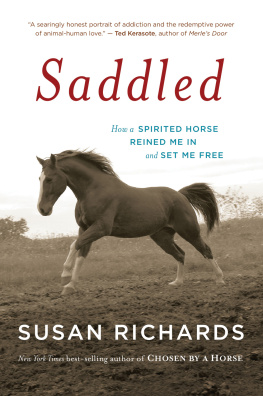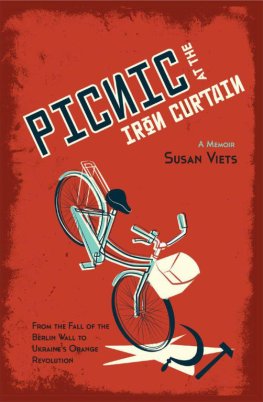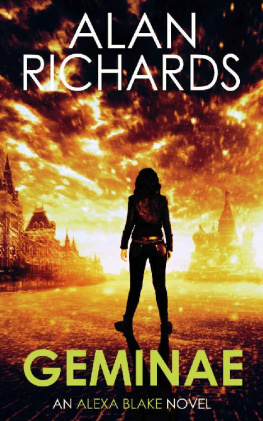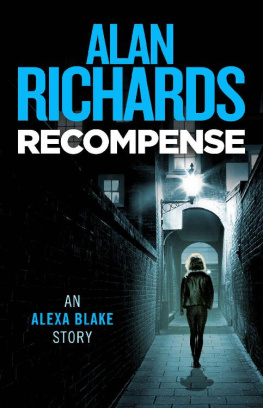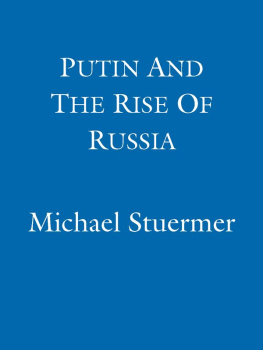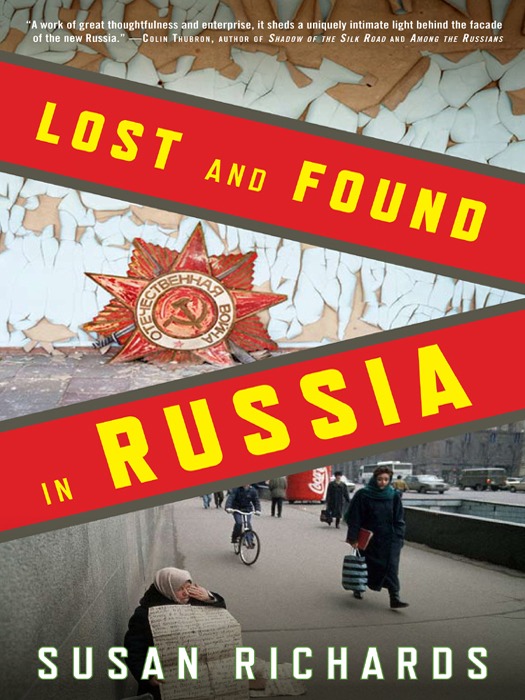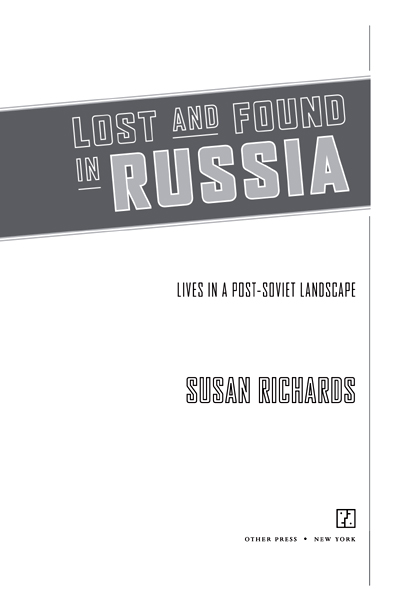Copyright 2009 Susan Richards
First published by I.B. Tauris & Co. Ltd. in the United Kingdom
Other Press edition 2010
Production Editor: Yvonne E. Crdenas
All rights reserved. No part of this publication may be reproduced or transmitted in any form or by any means, electronic or mechanical, including photocopying, recording, or by any information storage and retrieval system, without written permission from Other Press LLC, except in the case of brief quotations in reviews for inclusion in a magazine, newspaper, or broadcast. For information write to Other Press LLC, 2 Park Avenue, 24th Floor, New York, NY 10016. Or visit our Web site: www.otherpress.com.
The Library of Congress has cataloged the printed edition as follows:
Richards, Susan, 1948
Lost and found in Russia / by Susan Richards. Other Press ed.
p. cm.
First published in the United Kingdom by I.B. Tauris & Co. Ltd. T.p. verso.
eISBN: 978-1-59051-369-9 1. Russia (Federation)Description and travel. 2. Richards, Susan, 1948TravelRussia (Federation) 3. Russia (Federation)History1991Biography. 4. Russia (Federation)History19915. Russia (Federation)Social life and customs. 6. Social changeRussia (Federation) 7. Volga River Region (Russia)Description and travel. 8. Siberia (Russia)Description and travel. 9. Volga River Region (Russia)Social life and customs. 10. Siberia (Russia)Social life and customs. I. Title.
DK510.29.R54 2010
947.40861092dc22
[B] 2010011464
v3.1
For Roger
CONTENTS
PREFACE
THIS BOOK GREW OUT OF MY VISITS TO A SMALL, APPARENTLY UNREMARKABLE town. It begins when Russians were in shock, after the fall of communism. It ends when the country, flush with petrodollars and resurgent pride, is succumbing to global recession. It is the story of a nation going through a nervous breakdown, pulling through, but paying the price. It is about a people lost and found, about their search for meaning.
The vast stage of provincial Russia where the book is set barely connects to the world of Moscow and Petersburg. Its strangeness offers an explanation as to why we in the West are often baffled by Russia.
The friends I made in that small provincial town are the backbone of this book. For better and worse, their lives mirror Russias fortunes in its transition from chaos to order. I have tried to capture their experience. But I have come to accept that it is in the nature of the relationship between our cultures that they will think I have failed.
Anna, the tomboy, was born on the same date as me. On the surface we do not appear to have much in common, though in some obscure way we recognized that our lives are connected. Once, my friendship may have offered her support, but now things have changed so much that it runs the risk of damaging her. When we met, she was ready to sacrifice her life to build a free and democratic Russia. Today, she has found refuge in Russias resurgent Church.
Curly-haired, irrepressible Natasha was endowed at birth with privilege and talent. Following her rainbow had led her to that obscure country town. To the locals, she and her dashing husband, Igor, seemed every bit as exotic as I did, as a foreigner. Our otherness made us objects of suspicion.
The pale beauty Tatiana, with her innate wisdom, was the peacemaker in the volatile group. Back then, her husband, Misha, was one of millions of ants struggling to make the chaos work for them, fetching and carrying, dodging the heel of the law. Now, he is Mikhail Ivanovich, an important manufacturer. He and Tatiana may take their holidays in Provence, but when I look into Tatianas gray eyes I am afraid for her.
Hope brought us together. The year was 1992, and the euphoria of the Gorbachev period had evaporated. The story behind our hopefulness goes back two centuries, to when Catherine the Great became empress of Russia. A German princess, she dreamed of building an island of European values on the wild eastern frontier of her empire. Her people posted advertisements in Germany, promising fertile land, housing, and livestock to anyone who was prepared to settle there. Thousands responded. For a year they traveled east, then sailed down the Volga River. When they arrived they found nothing to match the promises. They were left in the wild steppe, a prey to vengeful Tartar horsemen.
Russian history seems to move in circles. Fast forward two centuries, to 1988 and the final days of communism. Again a Russian government was promising the descendants of those original German settlers that they could settle the same piece of landsince when the Nazis invaded the Soviet Union the entire community was deported, lest they collaborate. After the war, for decades they lived in exile in remote parts of Siberia and central Asia, accused of a crime they did not commit. Finally, almost fifty years later, Gorbachevs government agreed to give them back their original homeland, by way of making amends. What is more, the German government was offering the homeland money, in the hope that this might deter Russias Germans from moving back to Germany, as was their right.
This was what attracted Natasha and Igor to move there from the Caucasus, Catherine the Greats original dream of building an island of European values on the steppe, with German investment. It drew me there, too. We were all desperate for reasons to be hopeful. Even if the rest of Russia was paralyzed, I longed to find one small piece of countryside where people would be busy building the microcosm of a Russia worth living in.
But instead of a buzz of activity, I found a place embalmed in sullen silence. What had happened? No one would tell me. In fact, hardly anyone would talk to me at all; and yet it was that wall of silence that drew me back there over several years. It seemed to me that if I could understand, really understand, what was going on in the fog of confusion hanging over one small place, the larger picture of Russia in that confused time might become more comprehensible.
From there, I slipped through a crack in the wardrobe, into another Russia.
On the borders of early maps you sometimes find blank places where the mapmakers information peters out. Sometimes these are decked out with pictures of dragons and fabulous monsters, the creatures of travelers tales. That was where I was traveling during Russias lost years, way off the map of my known world. In the course of my journeys, President Boris Yeltsin sank deeper into a stupor, the oligarchs squabbled over Russias wealth, miners went unpaid, and teachers fainted from hunger in front of their pupils.
The agony of transition was throwing up strange manifestations that defied my plodding, Western rationality. While I could not share these collective visions of shining beings and visitors from distant planets, nor could I dismiss themtoo many people were seeing them, and their roots in the culture ran too deep. It took me a long time to accept that perhaps I had just ventured into a place where reality was different.
In these places off the map of my world I met another face of Russia, too, one where time had almost stopped, under the carapace of communism. There, choreographers, KGB colonels, and other urban refugees were happily building their New Jerusalem in Siberia, as sectarians have done for centuries.
But it was deep in the forest that I found myself face-to-face with the heart of whatever it is that makes the Russian people different. I found it hundreds of miles from the nearest road or railway, in a community vigorously pursuing the dream of a Russia which had never opened up to the West.


